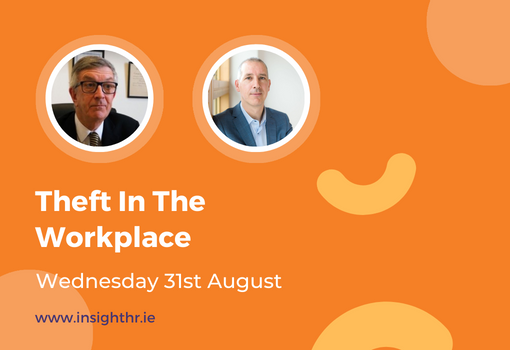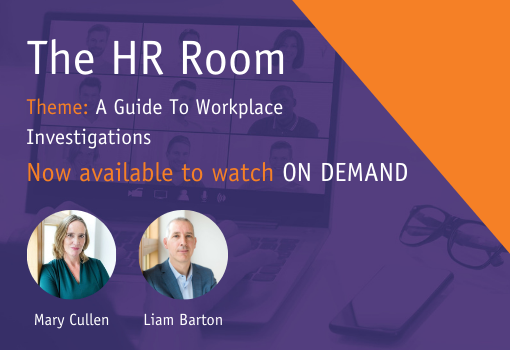Fraud in the workplace can throw an entire organisation into disarray. One needs only to look at the recent high-profile cases of Pat Hickey (OCI) or John Delaney (FAI) to understand how messy things can get. It is clear that fraud presents a huge problem to Irish businesses, and in turn for the HR functions that must address the issue. However, when it comes to dealing with fraud in the workplace, HR’s role is more than simply reactive.
Definition of fraud
Before we get into the specifics of HR’s role when it comes to fraud in the workplace, we thought it would be a good idea to frame exactly what we mean when we talk about fraud. Although there is no one definition for fraud, the Collins English dictionary defines it as “deliberate deception, trickery or cheating intended to gain an advantage”. It is considered an illegal act and it is characterised by deceit, concealment and violation of trust.
Some common examples of fraud include embezzlement; misappropriation or misapplication of funds and/or property; forged signatures on cheque books or cash related documents; and alteration or falsification of documents or computer files.
How does fraud happen?
It is perhaps unsurprising that most occupational fraud is committed by trusted employees who know where weaknesses exist. They are often first-time offenders – never having been charged or convicted of a fraud-related offence and never having been disciplined or terminated by an employer for fraud-related conduct.
So, what happens to make these trusted employees go rogue? There are three factors which must be present for the ordinary employee to commit fraud. One classic model used to represent this is the so-called Fraud Triangle – associated with the American criminologist Donald R. Cressey. Cressey claimed that three elements needed to be present – opportunity, motivation and rationalisation.
Opportunity is typically caused by the absence of sufficient internal controls. Motivation can include financial need, resentment towards one’s employer, addictions and pressure to achieve. For example, people can be motivated to commit fraud because of their personal perilous financial situation, even if they do not feel a strong grievance towards their employer. The third element, rationalisation, occurs when the perpetrator can reason to themselves that they are not doing something wrong. For example, they might be intending to repay the money.
Reducing the risk of fraud occurring
The obvious way to reduce the opportunity for your employees to commit fraud is by improving your internal controls, for example, through management oversight and ensuring that no single individual has excessive financial power or control. You can reduce the motivation of employees to commit fraud through such means as providing an employee assistance programme that helps employees that are experiencing significant stress. You can have a strategic focus on increasing employee engagement – a focus that informs your decision-making. This work could include periodically surveying your employees. This focus on engagement has the benefit of reducing the chances of an employee being tempted to commit fraud. You can also ensure that your financial goals, though challenging, are achievable, without your people feeling excessive pressure.
This may seem blindingly obvious to you, but do your employees actually know what fraud is? Do they know that committing it is contrary to the terms of their employment? Do they grasp that if they commit fraud that they may be putting jobs in jeopardy? If the answer to any of these questions is no, then you may have an organisational information deficit that needs remedying. The way to address this is to ensure that your organisation has established clear policies and procedures, that your employees are aware of those policies and procedures, and that management creates a culture that expects and models honesty.
Most commonly, employers become aware of a fraud through a tip-off from a staff member or through accidentally noticing an irregularity. Both of those means of detection rely on employees – be they at management level or not – being observant and proactive. Those behaviours are not universal. Your culture, as well as your policies and procedures, should show your employees how seriously you take fraud and general wrong-doing.
You can also help prevent fraud by making good hiring decisions in the first place. Properly written and followed recruitment and selection policies will help in this respect, for example, through a rigorous interview process that includes a probe of candidates’ ethics followed by a robust verification and reference checking process.
However, it is not enough to simply hire the right people. You need to actively support and facilitate the behaviours you want to see. For example, you can make it apparent that whistleblowers will be protected, in line with The Protected Disclosures Act 2014.
Whistleblowing legislation and a whistleblowing policy are important tools to improve responsible behaviour by organisations. They can also lead to more responsible behaviour by people in organisations. It is not enough, however, just to have a whistleblowing policy in place. It is also essential to deal professionally and objectively with any whistleblowing that occurs – and ensure that management is neither unresponsive nor hostile to the whistleblower. Being unresponsive will increase the chances of the employee making their concerns known externally and may ultimately expose the organisation to compensation of up to 5 years’ remuneration for dismissal on grounds of having made a protected disclosure.
Your employees must also know what the appropriate steps are that they need to take in making their concerns known. Indeed, if they do not, the chances of them speaking out is reduced. And it also needs to be spelled out to them that they are safe from repercussions even if the information disclosed does not on examination reveal wrong-doing.
Like individuals, organisations too can learn from mistakes. If your organisation has been unlucky enough to have been the victim of fraud in the past, then you should analyse why and how that fraud was committed. Doing this may reveal things that you could do differently to prevent a recurrence. Also, prosecuting the alleged offender can act as a disincentive to others – both those employed by you and those whom you might consider recruiting in the future.
We hope that this article has given you some food for thought. However, if you need some further help safeguarding your organisation, be sure to get in touch with us for a confidential discussion.
Theft in the Workplace
Join the Insight HR team and our special guest, Richard Grogan, on the 31st of August at 11:15 for our webinar on Theft in the workplace, where we will be taking a closer look at the legislation, procedures, and key considerations governing this tricky topic.
The HR Room is a FREE monthly online forum run by Insight HR where you can receive expert HR advice and have your burning questions answered.
Workplace Investigations
In this instalment of the HR Room series, Mary Cullen (Founder & Managing Director), and Liam Barton (Senior HR Consultant) shared expert guidance, information and key considerations for conducting workplace investigations.
This is an ON DEMAND recording of a webinar which took place on the 23rd of February 2022.




